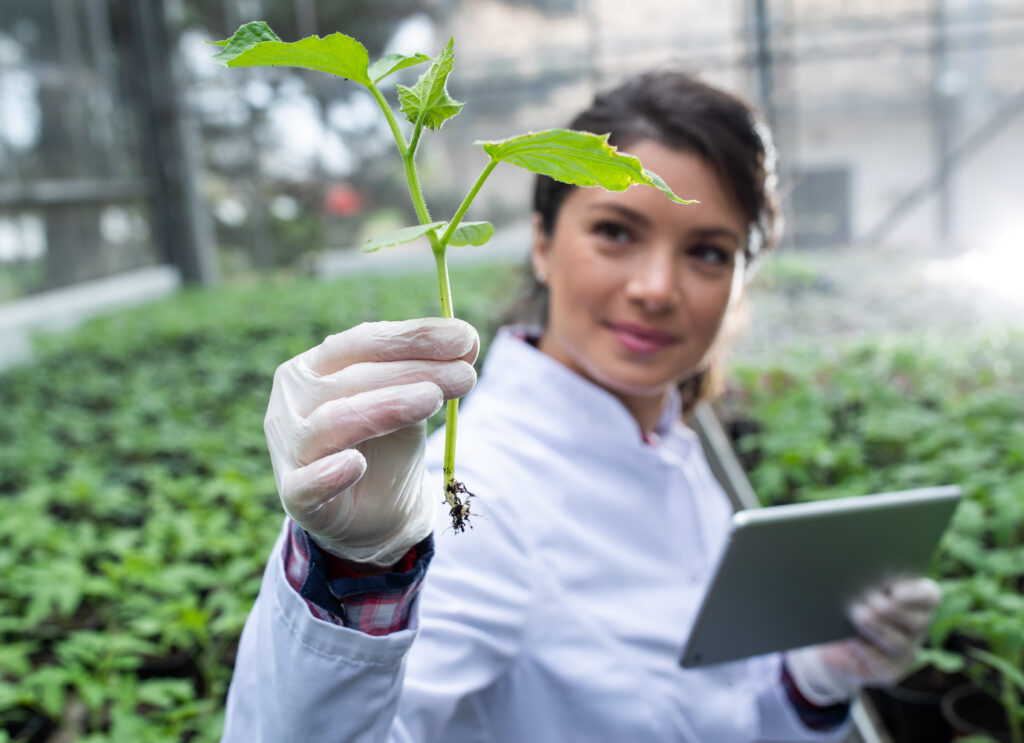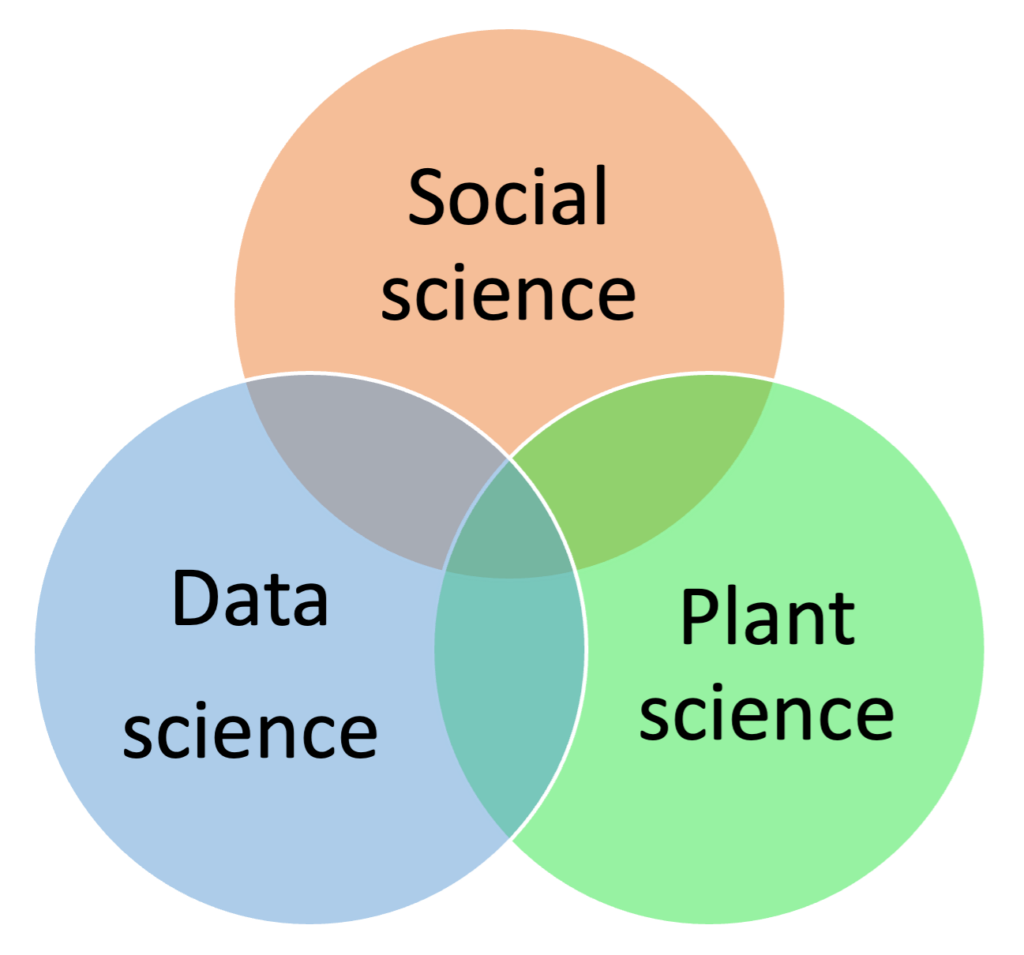How can we develop crops that can feed the world in the face of a changing climate? How can we leverage revolutionary tools in Artificial Intelligence and data science to develop such crops? And how can we do so in a socially responsible manner? The interdisciplinary minor ‘Climate Resilient Crops: Interdisciplinary Approaches’ brings together cutting-edge knowledge from plant science, data science, and social science to equip you with the tools to tackle one of the most pressing issues of our time.

Urgent societal questions
Plant breeding has revolutionised agriculture, boosting the yield, variety, and quality of crops. However, with a growing global population and increasing climate pressures, new challenges have emerged. Heatwaves, droughts, floods, pests, and poor soils hinder agriculture production. There is an urgent need to produce crops that can withstand these extreme and unpredictable conditions. This calls for climate-resilient crops that can thrive under unpredictable and extreme conditions.
Yet, developing climate-resilient crops is highly complex. It requires knowledge of the interplay of numerous genes, processes, and the way trade-offs are balanced. Moreover, food producers around the world may have diverging views on which resilience traits are most beneficial for a specific context. In addition, there may be many other challenges. Think of obstacles related to organisational routines, government regulations and market structures. These can all impede the development and uptake of climate-resilient crops.
An interdisciplinary minor
This minor will enable you to gain knowledge of resilient crop development through a highly interdisciplinary approach, making it unique. The curriculum combines recent developments in plant science, social science, and data science. You will learn the fundamental concepts of these three fields. Next, you will apply these to resilient crop development, and you will practice interdisciplinary knowledge integration and communication. Finally, you will deploy all this knowledge and skills whilst working on an interdisciplinary group project. This real-world case offers you the opportunity to contribute sustainable and innovative solutions to develop climate-change resilient crops.

The minor consists of two
compulsory courses and three elective courses, allowing you to tailor your studies to your specific interests. We encourage you to select courses that broaden your perspective, offering you insights beyond your current field of expertise.
This will prove to be invaluable during interdisciplinary collaborations in both the first and final courses. Below is an overview of all the courses you can choose from Wageningen University and Research (WUR):
For whom?
This minor is for anyone interested in developing climate-resilient crops and exploring the interdisciplinary approaches involved. Students from social sciences, life sciences, or data sciences are all welcome.
When?
Starts period 1 in the academic year 2025/2026 and lasts for half a year (Sept 2025 – Jan 2026). The deadline to apply is August 3, 2025.
Where?
The minor will be taught at Wageningen University and Research. Physical attendance will be required on some days during the minor.
How to apply?
-Please read the information on how to apply first.
-Then fill out this enrolment form
-For other questions please send an e-mail to resilientcrops.pph@wur.nl
Please be aware that you have to register for each of the courses separately.
More information about the minor in the Wageningen University study handbook.
Curriculum and course information
Curriculum
PERIOD 1 (SEP-OCT)
Morning
FSE21306 Exploring the Future of Farming and Food
BIF20306 Introduction to Bioinformatics
Afternoon
PPH20806 Introduction to Climate-Resilient Crops: Biology, Data & Society
PERIOD 2 (NOV-DEC)
Morning
EZO23306 Modelling Biological Systems
GEN20806 Plant Biotechnology
ENP23806 Sustainability Transitions: Concepts, Issues and Indicators
Afternoon
HPP23806 Crops, Physiology, and Environment
ABG30306 Genomics
PPS31306 Global Food Security
CPT22306 Communicating for Sustainability and Responsible Innovation
CPT37306 Politics of Knowledge and Inclusive Innovation
CPT22806 Innovation and Transformation
RSO34806 The Politics of Food Systems Transformations
PAP10806 Perspectives on Sustainable Transitions in Agriculture
PERIOD 3 (JAN)
Full day
PPH33306 Climate-Resilient Crops: an Interdisciplinary Challenge
More info about the courses
At the start of the minor, you will take the course Introduction to Climate-Resilient Crops: Biology, Data & Society which will prime you on key concepts you come across in the other courses in the minor, so you can directly link these concepts to plant resilience. Furthermore, this course provides sufficient background knowledge to participate in the restricted optional (RO) courses of the minor. Finally, this course helps you identify gaps in your knowledge, enabling you to make informed decisions when selecting courses for the second period of the minor.
To give structure to the minor we have created three clusters of courses and we would encourage you to choose courses from the clusters that teach you about fields you are least familiar with. This way, it will provide a basic understanding on how different fields approach crop resilience-related problems and will allow communication with students from other backgrounds more effectively.
NB: Clusters are only a suggestion to give structure, they can be ignored if you want to tailor the minor towards your specific interests.
Cluster Quantitative Resilient Crop Development
This cluster focusses on teaching quantitative, modelling and/or computational techniques that are used for resilient crop development. Courses such as Genomics, Introduction to Bioinformatics, and Modelling Biological Systems will familiarise you with quantitative approaches to investigate relationships between genotype, environment, and phenotype.
Cluster Biology of Resilient Crops
This cluster focusses on the (molecular) biology that underlies resilient crops. If you want to know more about the practical application of biological insights to develop resilient crops, you can select Plant Biotechnology, which discusses molecular techniques and touches upon societal and ethical aspects of crop development. Alternatively, you can select Crops, Physiology, and Environment, which provides quantitative concepts of crop physiology relevant for crop production.
Cluster Societal Impact of Resilient Crops
This cluster teaches you about different societal factors that determine how innovations can contribute to society, the different trade-offs that are involved, and how to innovate responsibly. The courses Global Food Security, Exploring the Future of Farming and Food, Innovation and Transformation and The Politics of Food Systems Transformations teach you how to critically think about food security and production. Courses like Communicating for Sustainability and Responsible Innovation, Sustainability Transitions: Concepts, Issues and Indicators, Politics of Knowledge and Inclusive Innovation and Perspectives on Sustainable Transitions in Agriculture take a more general viewpoint and discuss how innovation in general can best be implemented and communicated.
As a final course in the minor, Climate-Resilient Crops: an Interdisciplinary Challenge will allow you to use the various skills you have learned during the minor in an interdisciplinary group project. Also, you will learn from other students what different approaches they have learned during their minor and practice interdisciplinary integration and communication.

